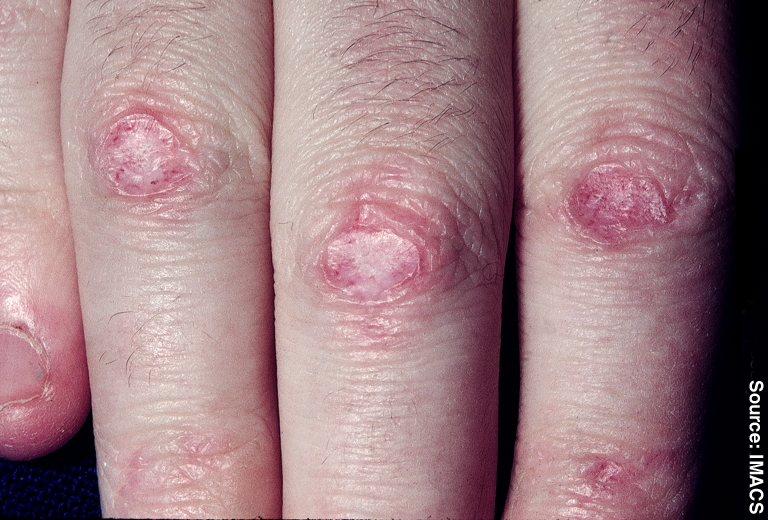Dermatomyositis is a disease of the connective tissue that is related to polymyositis and can cause inflammation of the skin and muscles, among other symptoms.
Who gets it?
“While the exact cause of dermatomyositis is unknown, it may be the result of an initial viral or bacterial infection or of subsequent treatment in genetically predisposed individuals,” says Dr. Kellie Reed, a board certified Dermatologist at Sanova Dermatology in Austin, Texas. It is twice as common in women than in men, and while it can occur at any age, it is more commonly seen in the 5th decade and in children between 5 to 10 years of age. Dermatomyositis is not that common, and is estimated to affect about 9.6 per one million people in the United States.
What kind of changes can you see in the skin?
Dermatomyositis can cause:
- skin irritation
- skin rash
- rough and cracked skin at the tips of the fingers
- scaly eruptions on the interphalangeal joints (called ‘Gotton’s sign’)
- a ‘lilac’ rash on the upper, and occasionally lower, eyelids
- flat erythematous lesions which rest in a V over the neck and back or neck and trunk and worsen with UV light
- linear streaks on the trunk
- deposition of calcium in the skin (seen in juvenile cases)
- red patches or scaly eruptions which over the elbows, knees, and knuckles (called ‘Gottron’s papules’)
What other symptoms does it have?
Other symptoms of dermatomyositis include:
- systemic muscle weakness
- pain and tenderness
- difficulty swallowing
- respiratory compromise
- cardiac irregularities
Are there other concerns?
Dermatomyositis has been associated with underlying malignancies, especially ovarian cancer. “Women who develop dermatomyositis should be screened for underlying cancers,” notes Dr. Reed.
How is it treated?
“Treatment for dermatomyositis is usually done with steroids and other immune suppressing medications,” explains Dr. Reed. Afterward, specialized exercises and therapy can be done to help mitigate symptoms and improve patients’ quality of life.
Contact Us
If you would like to have your skin checked by our certified dermatologists, or would like more information on dermatomyositis, contact us.
Photo credit: (1) Elizabeth M. Dugan, Adam M. Huber, Frederick W. Miller, Lisa G. Rider - 